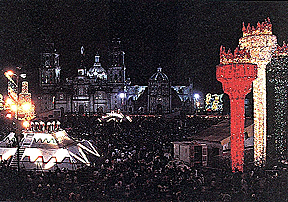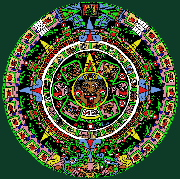ME AND
JULIO DOWN BY THE ZONA ROSA
by
Bob Brooke
 It’s
Fiestas Patrias, Independence Day in Mexico, as a four-hour long parade
of soldiers, athletes, horsemen, fathers and sons, mothers and
daughters, makes its way up the Paseo de Reforma from the Zocalo to
Chapultepec Park in Mexico City. It’s
Fiestas Patrias, Independence Day in Mexico, as a four-hour long parade
of soldiers, athletes, horsemen, fathers and sons, mothers and
daughters, makes its way up the Paseo de Reforma from the Zocalo to
Chapultepec Park in Mexico City.
I make my way through the crowd to a vantage point on the monument to
Cuahtemoc near the Zona Rosa. A older gentleman, named Antonio, helps me
up onto the monument so that I can get a better view.
"It wasn't long ago that I was marching in that parade," he
says. "We were all so proud. Everyone wore their best clothes. I
can remember how my father made sure that my sombrero was on straight. I
pretended that I was a wealthy haciendado riding my horse up the
Reforma before there were automobiles. Is this your first parade?"
"Yes," I reply.
"Look over there," he says, as he points to a woman selling
wooden boxes. "Do you see those
boxes? They are renting them to stand on so that they can see the
parade."
As Antonio points out the crates, I notice young men standing on the
roof of a bus stop, a family of five is lying on blankets on the roof of
their father's taxi, a young boy is sitting on his brother's shoulders.
I say goodbye to Antonio and move on up toward Chapultepec Park. The
air hangs heavy with the pungent smell of oil and roasted corn. All
sorts of vendors line the Reforma. Young Indian women sell food at
make-shift stands--tortas, chicarrones, tostados.
Older women sell egg shells filled with confetti. Boys sell games and
toys. Men sell nuts of all kinds, and dates filled with nuts. Some give
away little bags of peanuts to parade watchers.
A little girl of about six, her face all sticky with pink fuzz, looks
out from behind the biggest ball of cotton candy she can find. Another,
smiling from ear to ear, has just taken a big bite of a mango on a
stick.
Everything is For Sale
Everything is for sale--hot dogs, fresh fruit, mezcal, mounds
and mounds of watermelon, tiny grilled tortillas, cucumbers. But the
most unusual items are handwoven palm-frond hats that passersby purchase
to protect them from the hundreds of rockets that constantly explode
overhead.
Though the people, themselves, are quiet, there's a raucous symphony
of horns blowing. Bands play patriotic songs and marching groups sing
along. I feel even more stirred inside than last night at the Zocalo.
It's Mexican life multiplied one hundred fold. A rainbow of color, a sea
of humanity as far as I can see in all directions.
As the parade makes its way to Chapultepec Park, the crowd meanders
along and I follow. This is possibly the biggest fiesta in Mexico.
Families sit in circles on the grass munching on fruit and roasted corn.
The niños play with the pinwheels on each other's heads. A young
couple nestle in a loving embrace.
I stop to smile at a young boy having his picture taken. He sits
astride a pony and wears a sombrero so big it makes his ears stick out
at right angles to his head. For a moment, I remember when I was a kid
and the photographer with his pony used to come to my house to take my
picture in my cowboy outfit.
Indian women sit on the grass patting tortillas, their babies sound
asleep on blankets, oblivious to all the excitement around them.
Just as along the parade route, vendors offer a variety of items for
sale. But unlike those along the
Reforma, there are finely crafted pieces from all over the country. A
young boy purchases a little bird in a basket. The man selling it has
others in cages.
Independence
Day is for Children
Independence Day is for children. Mimes entertain starry-eyed
children. An organ grinder cranks out a tune on his ornate box as his
monkey dances to the delight of laughing tots.
A young girl of fifteen, named Dolores, comes up to me and hands me a
small gaily painted box. "This is for you," she says. "We
are so glad that you've come to spend Independence Day with us. I want
you to have this to remember it by."
Overwhelmed
by the gift and the sentiment, I thank her. This would have never
happened back home.
Exhilarated by the events of the day, I go over to the Hotel Camino
Real across from the park to meet my friend and fellow writer Jim
Barnes. He has been living in Mexico City for the past ten years and has
developed quite a market for his work. Jim, a giant of a man with his
blond hair streaked with gray, seems out of place among the Mexicans. In
all this time, he still hasn't learned any more Spanish than I. It's
been several years since I last saw him on a trip to L.A. Jim hasn't
changed, although I think I have.
We meet in the stark dark pink and red contemporary lobby of the
hotel. "Why don't we go over to the Zona Rosa and get a bite to
eat," he suggests. "I know this great Italian place, La
Pergola, on Hamburgo Street. Their fettucine alfredo is out of this
world."
"Another thing you ought to do is get your shoes shined. These
Mexican kids do a great job. It's worth the dollar or so you pay
them."
We decide to walk. The night is clear, the air slightly cool. It
seems like everyone is out. The grassy knoll above the Chapultepec
subway stop is packed with people. Kids run around in little gangs,
playing their version of tag. We duck down through a pedestrian
underpass. I notice a boy selling miniature wooden tops. I buy a half a
dozen to hang as ornaments on my Christmas tree.
It takes about a half hour to walk over to the Zona Rosa. Most shops
and restaurants are closed for the holiday. Denny's, of course, is open.
About a block from La Pergola, an older boy in his late teens, named
Julio, stops us. "Do you have the time, señor?" he asks Jim.
"Eight o'clock," Jim replies.
Meeting Julio
"How about a shoe shine, señor?" he asks as he bends down
to brush some polish on my shoe."
"No, thanks," says Jim.
"Oh, come on. Why not?" I reply. "You just got done
telling me I ought to have my shoes shined."
Before another word can be spoken by either of us, Julio sits me down
on the edge of a concrete planter and hurriedly wipes a liquid all over
my shoes.
"I give you the best shine in Mexico," he says.
All the time he's doing this, I can't help noticing what little
equipment he has. Most of the other boys I saw along the streets today
had large wooden shoeshine boxes filled with a variety of brushes, rags,
and polishes.
Before we know it, another boy comes out from around the corner and
begins to put polish on Jim's shoes. Jim refuses a shine, but the more
he refuses, the more the other boy insists.
"How much?" Jim asks.
"One hundred pesos," replies the boy.
"No way," says Jim, as he tries to get up to leave.
"I'll give ten." Jim stands and argues with the boy.
By this time, I have already paid Julio 200 pesos. Before we know
what's happening, the other boy grabs my wallet, which I still have in
my hand, and runs with it into the crowd. We both call for help. Because
of the holiday, there are few policemen on duty. Try as we might, we
find none. I look down at my shoes. The "polish" is already
beginning to flake off.
"Let's go eat. I'm starved," says Jim.
"I'm not hungry anymore," I reply.
Jim lends me enough money to get back to my hotel. Luckily, I only
brought along enough cash for dinner and taxi fare. The emotional high
of the last two days tumbles to a crashing low.
I flag down a taxi. After driving a few minutes, the driver asks,
"Can I get you some entertainment, senor? How about a pretty
senorita?"
"No, thanks."
"Then how about a pretty boy, instead?" |

